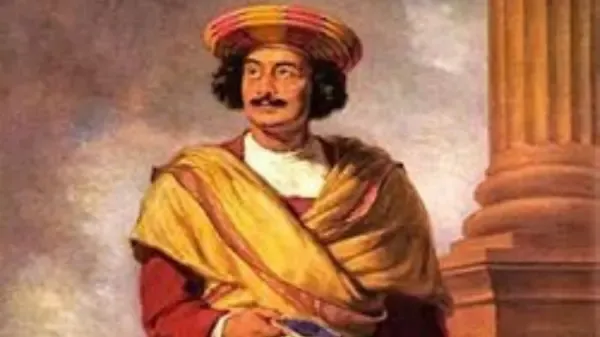Raja Ram Mohun Roy was an Indian socio-religious reformer, journalist, and writer, who was known as the Father of the Indian Renaissance. He was a founder of the Brahmo Sabha, the precursor to the Brahmo Samaj. He was a pioneer of modern India and was called "the first man of new, regenerate India" by Rabindranath Tagore. He advocated for the abolition of social evils like sati and child marriage, promoted modern education, and worked towards the integration of Eastern and Western philosophies. He wrote Gaudiya Vyakaran, which was the first complete Bangla grammar book. He was the first to introduce the word “Hinduism” into the English language in 1816.
Ram Mohun Roy was born on May 22, 1772, in Radhanagar, Hooghly District, Bengal Presidency, into a prosperous family of the Brahmin class (varna) in British-ruled Bengal. His great-grandfather, Krishnakanta Bandyopadhyay, was a Rarhi Kulin (noble) Brahmin. His father, Ramkanta, was a Vaishnavite, while his mother, Tarini Devi, came from a Shaivite family.
During his childhood, Ram Mohan Roy witnessed the death of his brother Jag Mohan Roy's wife through sati. The seventeen-year-old girl was dragged toward the pyre, where Ram Mohan Roy saw her terrified state. He tried to protest, but to no avail. She was burned alive, and the people chanted, "Maha Sati! Maha Sati! Maha Sati!" (great wife) over her painful screams.
Ram Mohun Roy began his formal education at a village pathshala (traditional school), where he learned Bengali, Sanskrit, and Persian. His teacher in Sanskrit language and literature was Nandakumar Vidyalankar. He later studied Persian and Arabic at a madrasa in Patna. He was then sent to Benares to study Sanskrit and Hindu scriptures, including the Vedas and Upanishads. This education provided him with a strong foundation in Hindu philosophy and religious texts.
He mastered several languages, including Sanskrit, Persian, Arabic, and English, in addition to his native Bengali and Hindi. His linguistic skills enabled him to engage with diverse cultures and intellectual traditions. During his employment with the British East India Company, he was introduced to Western culture and literature, which influenced his reformist ideas and efforts.






0 Comments